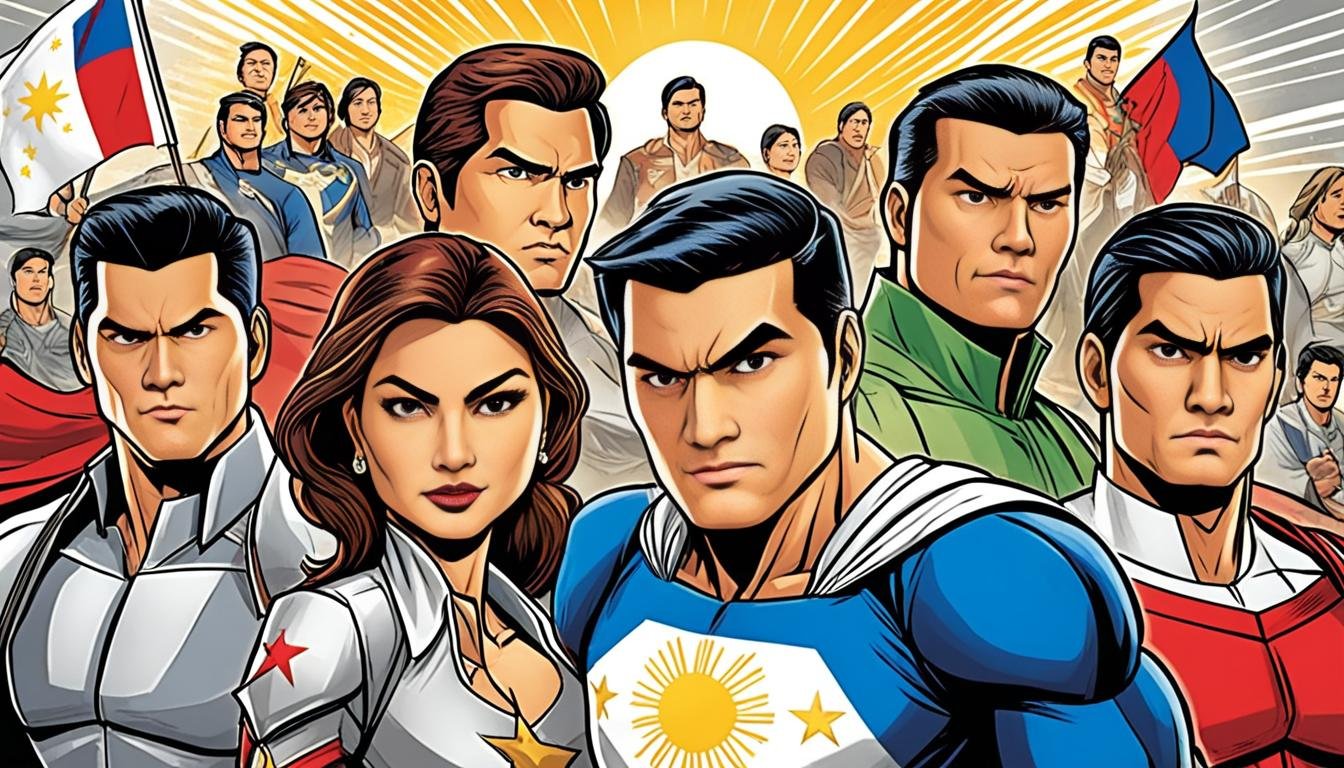Do you think you know everything about Filipino heroes? Get ready to be blown away. We’re revealing untold stories and shocking facts that changed the country’s history. Filipino heroes have some surprising secrets and their legacies will make you rethink what you know.
Key Takeaways:
- Discover the lesser-known facts about Filipino heroes and their contributions to the nation.
- Explore the unconventional methods these heroes employed to challenge colonial powers.
- Uncover the sacrifices they made for the sake of independence.
- Gain insights into how Filipino heroes have shaped the cultural and political landscape of the Philippines.
- Reflect on the significance of their actions and how they continue to inspire generations.
The Unconventional Pariah: Jose Rizal’s Brush with Death
No Filipino hero is as fascinating as Jose Rizal. He was born on June 19, 1861, in Calamba. Growing up, Rizal became a top writer, a reformist, and a beloved figure in the Philippines.
Rizal was different from the start. He stood against the Spanish rule with his clever mind and words. Instead of violence, he believed in peaceful ways to make things right.
His life was always in danger. The Spanish rulers did not like what he wrote. They arrested him many times for speaking out against them and for showing the suffering of his people.
On December 30, 1896, Rizal was killed because of his beliefs. His death sparked a fight for freedom in the Philippines. He inspired many to stand up and fight against the Spanish.
Rizal’s strong belief in peaceful change and his death for freedom left a deep mark. He is a symbol of courage and hope for the Philippines. His memory keeps alive the dream for equality, justice, and unity.
Continue reading here to discover more intriguing facts about the moon.
A Name That Echoes Through History: Jose Rizal’s Full Identity
We will explore Jose Rizal’s life, starting with his birth in Calamba, Laguna. He was born on June 19, 1861. His parents were Francisco Mercado Rizal and Teodora Alonso.
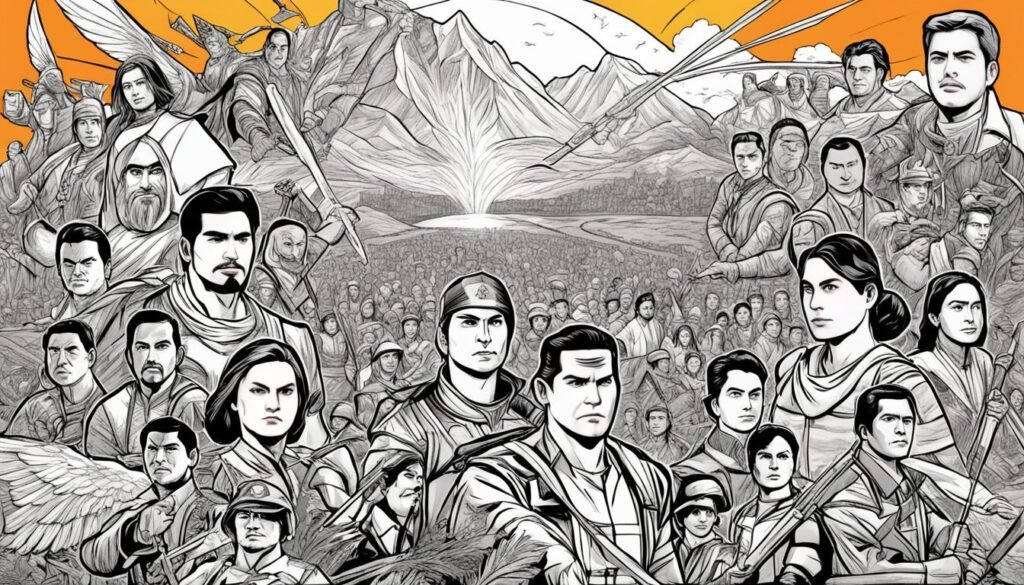
Rizal’s background heavily influenced his values. His parents taught him about love for one’s country and the importance of education.
The young Rizal was exposed to European literature. He looked up to thinkers of the Enlightenment. His travels shaped his views on society and politics.
| Early Life | Family Background | Influences |
|---|---|---|
| Since childhood, Rizal showed great intellectual promise. He was curious about many subjects, like science, art, and literature. | His mother, Teodora Alonso, was his first teacher. She was educated and instilled a love for learning in him. She also taught him about social justice. | These early influences sparked Rizal’s ambition. He wanted to improve life for his fellow Filipinos. |
| Rizal’s full identity includes his sharp intellect and his fight for his countrymen’s rights. He was also a talented artist. | This text aims to reveal the person beneath the fame. We hope to show why he’s a symbol of courage and national pride. | By learning more about Rizal, we can better understand his impact on his country. He remains a highly respected hero in the Philippines. |
Rizal’s Unseen Turmoil: The Early Years in Calamba
In Calamba, young Jose Rizal faced many challenges that prepared him for his future. These struggles changed how he saw the world. They also inspired him to work for justice and freedom for his country.
The Mercado Family’s Influence
His family, especially his mom Teodora Alonso, played a big part in raising him. She was smart and forward-thinking, passing on those values to her kids. This made education and thinking about society important in their home.
“My mother’s teachings have always been my strength and my compass.” – Jose Rizal
Thanks to this caring, smart family, Rizal grew up to be a brilliant thinker. He learned to look at the world critically. These skills would later help him push for big changes in his country.
Ancestral Home Transformed into a Museum
The house where Rizal grew up is now a museum. It gives people a chance to step back in time. Inside, visitors can see things that were part of Rizal’s life. This includes important memories and his personal items.
This museum helps us understand the struggles Rizal faced in his early days. It also shows the difficult times his country was going through. Both of these things made him want to make the world a better place.
Rizal: The Student Who Outshone in Europe
Jose Rizal stood out in Europe, showing his bright mind and hard work. He excelled in many areas, becoming a leading figure in fields like medicine and literature. His work is remembered by many in Europe.
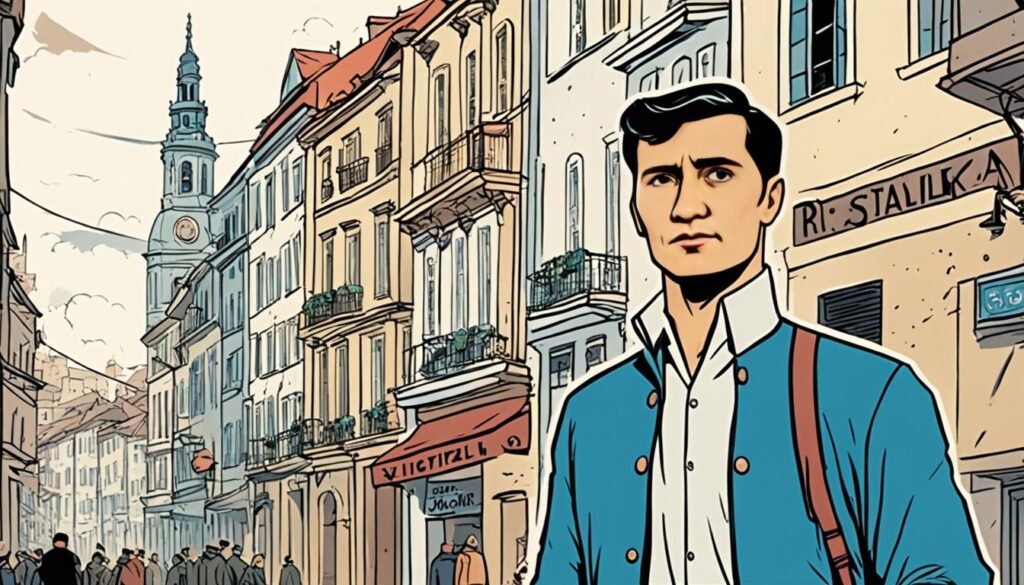
Rizal loved learning and did well in his studies. He went to Europe to learn more and grow his knowledge. There, he took on tough courses and always learned more.
In Europe, Rizal learned a lot and saw many different ways of life. This made him want to help make things better in his home country. It gave him a strong reason to work hard for others.
In Europe, people noticed how smart and talented Rizal was. He became known in the academic world because of his work and ideas.
Rizal wrote famous books and made big steps in medicine. His work still influences people today and tells us a lot about Philippine history.
Rizal’s dedication and love for learning made him stand out in Europe. He showed that with hard work, anyone can achieve great things. This inspired many.
When we look at Rizal’s time in Europe, we see a turning point in his life. It shows how his great work and talent made a big impact. Let’s learn more about how this student became a shining star in Europe.
For more information on the Philippine Revolution, visit https://www.britannica.com/event/Philippine-Revolution.
The Polymath: Jose Rizal’s Versatility in Languages and Arts
Jose Rizal: A Linguistic and Artistic Genius
Jose Rizal wasn’t just a national hero; he was a polymath, excelling in many areas. His ability in languages and arts highlighted his amazing talents and wide-ranging intellect.
Rizal was a topnotch doctor and writer. He also knew several languages well. These included Spanish, English, French, German, and Chinese. His language skills helped him share his thoughts widely and push for change globally.
Subversive Novels That Shook the World
Rizal’s novels had a huge impact. His books “Noli Me Tangere” and “El Filibusterismo” revealed the Philippine society’s problems under Spanish rule.
The stories woke up nationalist feelings in Filipinos and inspired them to seek freedom. Rizal’s strong storytelling and criticism of the Spanish brought hope and the will to fight for independence.
Contribution to La Solidaridad
Rizal helped publish La Solidaridad, a newspaper for change. It was a gathering place for Filipino thinkers and reformers.
In the paper, Rizal shared his passionate ideas and calls for respect for Filipinos’ rights. His writings united people in the Philippines and worldwide against colonialism.
| Jose Rizal’s Contribution | Impact |
|---|---|
| Mastery of multiple languages | Enhanced communication and global reach |
| Publication of subversive novels | Awakened nationalist sentiments and inspired revolutionaries |
| Contributions to La Solidaridad | Amplified the voice of Filipino intellectuals and advocates of reform |
Education and Advocacy: Rizal’s Life in Europe
We’ll look into Jose Rizal’s time in Europe, where he pursued education and fought for Philippine independence. Europe shaped Rizal’s beliefs, letting him dive into new ideas and cultures.
Rizal studied at the respected Universidad Central de Madrid in Spain. Here, he learned about medicine, literature, and philosophy. This broad education shaped his views and help him want change in his home country.
In Europe, Rizal met thinkers and activists striving for social and national reform. He joined discussions, voicing the needs of the Filipino people. This was where his strong nationalistic ideas took root.
Europe showed Rizal the power of freedom and equality. He became a leading voice for freeing the Philippines from Spanish rule. His time there fueled his passion for his homeland’s independence.
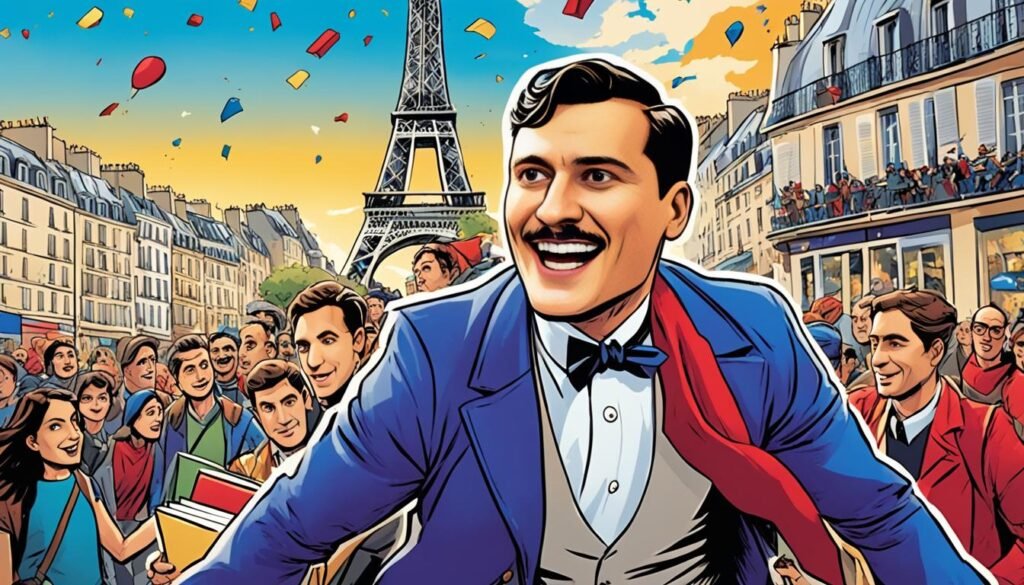
Living in Europe, Rizal saw the advancements made there. This made him believe that with the right chances, Filipinos could do the same.
He believed strongly in education’s role in changing nations. Rizal pushed for schools open to all Filipinos. He thought quality education was key to Philippine progress.
Rizal’s work for education and freedom still motivates Filipinos today. His legacy highlights the power of education and the challenge to help develop the country.
Continue reading: The 19th Century in the Philippines
Reformist Agenda: Rizal’s Political Blueprint for the Philippines
Jose Rizal was more than a smart writer. He was also a thinker and a man with a plan for the Philippines. He saw the need for big changes in society and politics. Rizal spent his life fighting for a brighter future for his people.
Rizal focused on three big goals: better education, equal rights, and a strong national identity. He thought everyone should have a chance to learn. For Rizal, good education was crucial. It could lift the entire nation up, no matter where people came from.
In his plans, Rizal wanted to change the country’s laws for the better. He pushed for a more fair government that listened to its people. He believed in a system where every Filipino had a say.
Rizal wasn’t afraid to think differently. His bold ideas inspired later fights for freedom in the Philippines. Through his books like Noli Me Tangere and El Filibusterismo, he shone a light on the flaws of colonial rule. He helped his people see the urgent need for a new way.
Understanding Rizal’s plans takes digging deep into his thoughts. Scholars have explored his works, like in this book. They uncover how Rizal’s ideas shaped Philippine politics and society.
| Rizal’s Reformist Agenda | Rizal’s Political Blueprint |
|---|---|
| Education for all Filipinos | Constitutional reforms |
| Promotion of equality | Empowerment of the Filipino people |
| National identity | Representation in government |
“The welfare of the people is the supreme law.” – Jose Rizal
Rizal’s plans still touch hearts in the Philippines today. His dream of a better society is a beacon for those who fight for fairness and change in the nation.
Jose Rizal’s Last Stand: The Execution That Galvanized a Nation
In his last moments, Jose Rizal remained strong, facing his fate bravely. He knew he was risking his life for the freedom of his people. This act made him a hero and a symbol of the fight against foreign rule.
Rizal’s final act inspired his fellow Filipinos. His bravery and ultimate sacrifice stirred a passion for liberty. This passion would carry them through the fight for independence.
Before his death, Rizal knew his stance would change his country’s future. His bravery became a turning point, showing the Philippines’ deep desire for freedom. It showed that they would not back down.
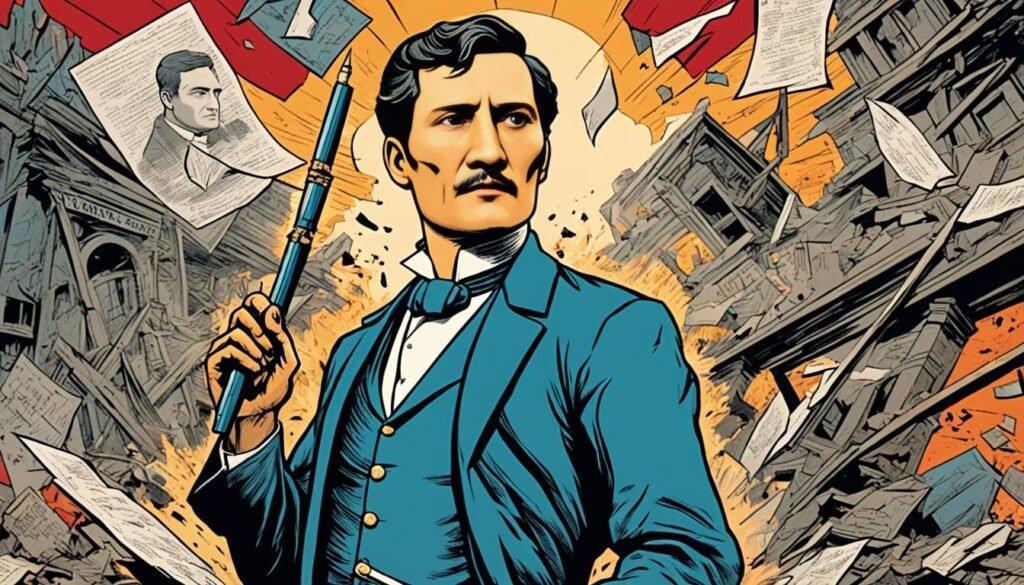
“I have always loved my poor country, and I am sure I shall love her to the last moment, even though others may offer me reasons to believe that she is all that is wicked and corrupt. My fatherland has a social cancer that soon will have to be cured. I wish to be present at its operation.”
Rizal’s death was more than a loss; it sparked a new sense of national pride. It encouraged the people to rise up and demand their freedom. It marked the beginning of a spirited fight against oppression.
His sacrifice inspired many others to join the cause. People were empowered to take action for their nation’s liberty. It fueled the revolution that ended the Spanish rule.
The day Rizal died was a new start for the Philippines. It set in motion events that would chart the country’s independent path. This day changed the nation forever.
Rizal’s courage became a beacon for the fight for freedom. His memory motivates Filipinos to this day. They work for a society based on justice and liberty.
Thinking of Rizal’s sacrifice reminds us how freedom is worth every effort. His story is a lesson in bravery and love for country. We honor him by continuing the fight for a brighter tomorrow.
Learn more about the events that led to Rizal’s execution and the impact it had on the Filipino nation.
Shocking Facts: Rizal Monuments Around the Globe
This section reveals surprising facts about Rizal monuments globally. They remind us of a hero influencing from Asia to Europe. We’ll look into where these monuments are and the parks honoring this inspiring figure.
Mementos of a Hero: From Asia to Europe
Rizal’s heroism goes beyond single countries with memorials in Asia and Europe. These are symbols of his ongoing legacy and universal respect.
In the Philippines, Luneta Park in Manila is significant. It includes a giant statue of Rizal. Here, Filipinos honor him for his national contributions and gather for important events.
Spain houses a memorial in Madrid, a city where Rizal lived. It represents his ties with Spain. The monument is in the Parque de San Antonio de la Florida.
In Hanoi, Vietnam, a memorial marks Rizal’s short stay. It shows the links between the Philippines and Vietnam. This highlights Rizal’s worldwide influence.
Monuments and Parks Named After Rizal
Many parks worldwide are named after Rizal. They are popular spots that honor his efforts and beliefs.
Rizal Park in Singapore is near its busy district. It’s a peaceful place named after him.
In the U.S., the Rizal Park and Bridge in Seattle remember him. They are cultural hubs, keeping traditions alive.
| Country | Monument/Park Name | City |
|---|---|---|
| Philippines | Rizal Park (Luneta Park) | Manila |
| Spain | Parque de San Antonio de la Florida | Madrid |
| Vietnam | Rizal Monument | Hanoi |
| Singapore | Rizal Park | Singapore |
| United States | Rizal Park and Bridge | Seattle, Washington |
These sites stand for Rizal’s bravery and the causes he fought for. They remind us of his life and what he believed in.
If you want to dig deeper into Jose Rizal’s life, visit this informative site. It offers quick info and insights about him.
Rizal as a National Icon: Portrayal and Perception Post Mortem
Rewriting Rizal’s Narrative: From Martyr to National Hero
After Jose Rizal died, people’s view of him changed a lot. He began as a martyr against Spanish rule. Then, he became a national hero, remembered for inspiring the fight for freedom. This shift honorably changed how Filipinos see him.
Rizal stood against Spanish colonization and became a vital symbol for resistance. His death sparked a revolution by inspiring many to embrace their love for their country. Though, his image evolved over time, showing he did more than just die for his beliefs.
People began to see Rizal’s broader impact on society. His books, like Noli Me Tangere and El Filibusterismo, questioned the Spanish oppressors. He united Filipinos in a quest for freedom through his powerful writings.
Rizal also shaped the Filipino identity beyond his books. He pushed for language and education reforms, and cared deeply for his people. His relentless commitment to bettering the country established him as a key figure in the fight for freedom.
Cultural and Political Impact of Rizal’s Legacy
Rizal’s teachings continue to shape Filipino culture and politics today. He inspired Filipinos to stand up against tyranny and injustice. His legacy has deeply influenced the nation’s history and the minds of its people.
Honoring him, the Philippines has many sites dedicated to Rizal and celebrates Rizal Day annually. His values are an important part of school education, ensuring the next generations remember his contributions.
Politically, Rizal’s thoughts still impact government policies. His dream for a fair society was at the core of the revolution and the country’s independence. Today, his ideals guide leaders in their efforts to improve the lives of all Filipinos.
In summary, Rizal’s image changed from just a martyr to a celebrated national hero. His extensive contributions are now well-known. His legacy lives on in the hearts and minds of all Filipinos, his impact unmistakable.
![]()
Rizal’s Poetic Valedictory: A Last Farewell That Echoes Through Time
This part will look closely at Rizal’s poetic valedictory. We will see how his last goodbye is still heard today. Rizal loved his country deeply and fought for its freedom. He spoke through his poems, showing both his skills and deep thoughts about love, sacrifice, and hope.
The Message of Love and Sacrifice
Rizal poured his love for the Philippines and its people into his poems. He showed his strong loyalty and care for his countrymen through his words. In doing so, he reminded everyone of the hard sacrifices made for independence and to make the country better.
Imagery of Loss and Hope within His Poems
Rizal often wrote about the losses his people suffered, showing the hard times under colonial rule. His words painted pictures of his people’s pain, making readers feel for them. But, he also talked about hope, showing Filipinos there’s a bright future. He said their efforts for freedom and fairness would win in the end.
| Poem | Key Themes |
|---|---|
| “Mi Ultimo Adios” (“My Last Farewell”) | Love for country, sacrifice, hope |
| “A La Juventud Filipina” (“To the Filipino Youth”) | Empowerment, national identity, the significance of youth |
| “Kundiman” (“Love Song”) | Love, longing for freedom, patriotism |
His poems, including “Mi Ultimo Adios”, “A La Juventud Filipina”, and “Kundiman”, deeply touch everyone. They are a key part of Rizal’s poetic farewell, reminding us of his powerful influence.
The Unseen Side of Emilio Aguinaldo’s Leadership
From Revolution to the First Philippine Republic
Looking at Emilio Aguinaldo, it’s important to see beyond what we know. He led the fight for the Philippines’ freedom from Spain. Born in Kawit, Cavite on March 22, 1869, he was a key player in this fight.
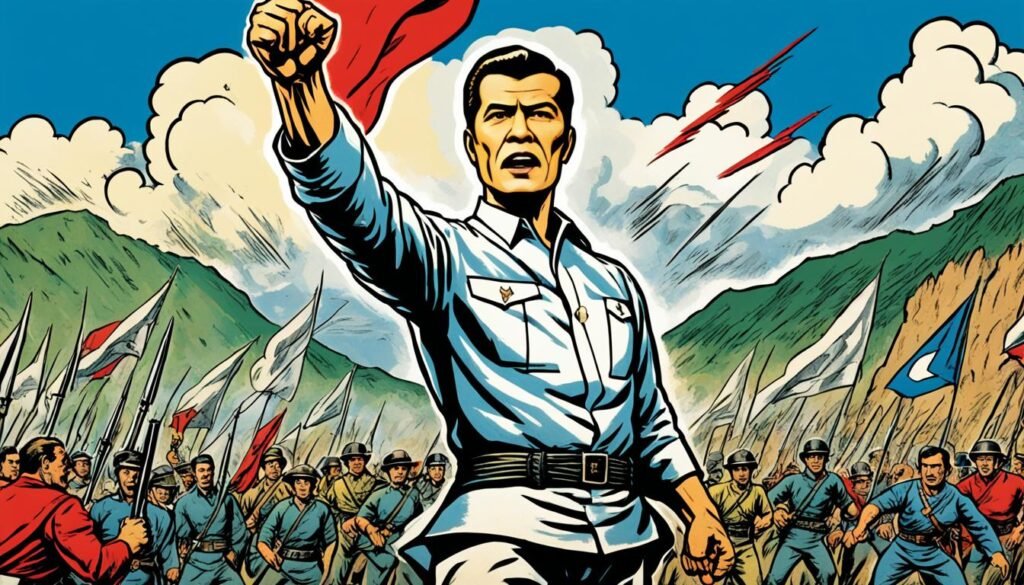
Aguinaldo stood out during the Philippine Revolution from 1896 to 1898. He won many battles against Spain. On June 12, 1898, he founded the Philippine Republic, becoming its first President. This was the start of the Philippines as a free nation.
But, his rule faced some issues and confusion. Learning about these problems helps us get a true picture of his work.
Controversies and Misconceptions Unveiled
Some people question Aguinaldo’s choices, bringing up tough topics like the killing of Andres Bonifacio. A debate also surrounds his decision to work with the United States during the Philippine-American War.
Was Aguinaldo forced to make tough choices, or did he seek his own benefit? These are tricky questions. By looking at many views, we might truly understand his actions.
Understanding these debates and myths can give a full picture of Aguinaldo’s role in history. It deepens our view of his leadership during the revolution and when the Philippine Republic was founded.
For more on Emilio Aguinaldo’s life, check out this New York Times article.
The Sacrifice of Teodora Alonzo: A Mother’s Grief
Teodora Alonzo was an unsung hero in Philippine history. She was the mother of Jose Rizal. The sacrifices she made and her endless sorrow helped shape her son’s life and legacy.
Throughout her life, Teodora Alonzo faced many challenges. As a mother, she sacrificed much for the well-being and education of her kids, Jose Rizal included. Her support and encouragement were key to nurturing Rizal’s mind and his dreams for a better Philippines.
Teodora Alonzo’s impact on Rizal surpassed their home’s walls. She planted a deep love for his country in him. This inspired his fight for the Filipino people’s freedom. Her strong love and faith in Rizal gave him the courage to become the hero we know today.
When Rizal was sentenced to death for fighting for his country’s freedom, Teodora Alonzo’s pain was immense. Her grief symbolized the deep sorrow felt by many in the Philippines for the loss of such a bright leader.
To learn more about Teodora Alonzo and how she influenced Jose Rizal’s life, you can read this article. It shares 12 important facts about the Philippines’ national hero.
Recognizing the Unsung: Other Heroes from the Annals of Filipino History
Besides famous figures like Jose Rizal and Emilio Aguinaldo, many unsung heroes exist in Filipino history. They worked towards the country’s freedom but are often forgotten. These heroes’ efforts were key in gaining independence and they continue to be an inspiration today.
The Lesser-Known Contributions to Independence
These less acknowledged heroes made big impacts in the independence fight. They used methods like guerrilla warfare and secret societies against Spanish rule. Through their actions, they helped lay the groundwork for a liberated Philippines.
Overseas Filipino Workers: The Modern-Day Heroes of the Philippines
Unsung heroes also include the overseas Filipino workers (OFWs). They go abroad to work, sacrificing time with their families. Their earnings sent back home are vital for many households in the Philippines. The money they send supports the economy and helps in the nation’s progress.
Moreover, there are also community leaders, educators, artists, and intellectuals who’ve played their part. They worked for independence but their efforts are often overlooked. Despite this, they have had a deep impact on Filipino society. And they motivate later generations to keep striving for freedom and justice.
Inspiration Drawn from Every Corner of the Archipelago
In the quest for independence, inspiration came from across the Philippine islands. Diverse cultures and traditions birthed unique forms of resistance. Every area of the Philippines has its own stories of brave individuals fighting for freedom.
For instance, the Muslim heroes of Mindanao and the indigenous groups guarding their lands are part of these stories. Heroes from all corners of the nation have significantly contributed to the struggle for independence.
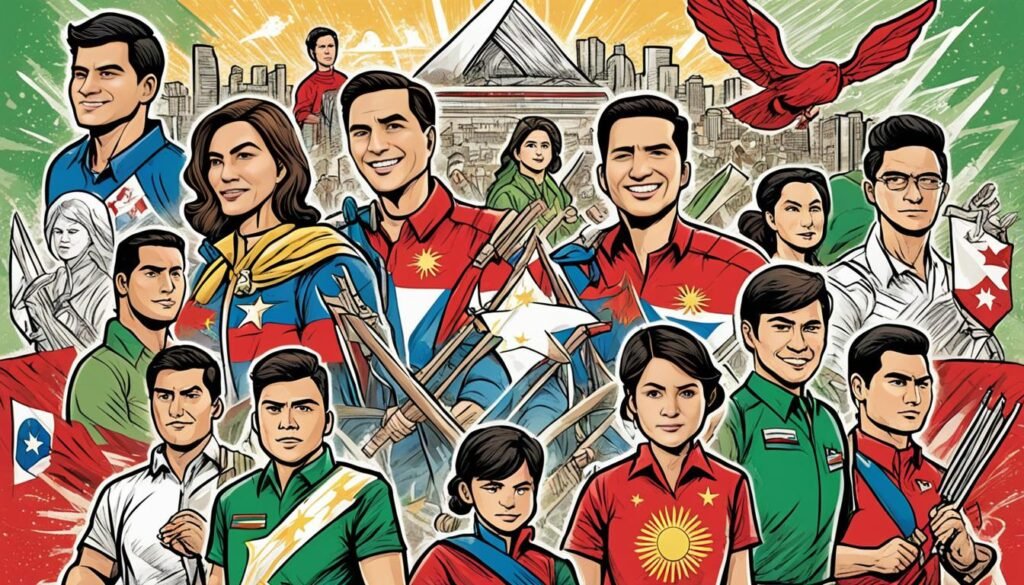
Conclusively, the well-known heroes are crucial in Filipino history, but the unsung heroes also deserve recognition. Their stories inspire us all to cherish liberty and keep working for a just society. The legacy of these unsung heroes highlights the enduring spirit and courage of the Filipino people.
Conclusion
We’ve shared some shocking and unknown facts about Filipino heroes in this article. The stories of such heroes and their sacrifices are crucial parts of the country’s history. These narratives show their remarkable bravery and strength.
We dived into the life of Jose Rizal, a true trailblazer. He faced great challenges early on in life, but his wide knowledge in various fields stood out. His bravery till the end fueled the nation’s push for independence and remains significant.
Still, Rizal isn’t the sole legend. Many unsung heroes made vital, although lesser-known, contributions. Their tales are truly inspiring, teaching us that valor and heroism exist everywhere in the Philippines.
Our journey through Filipino heroism ends here. We aim for you to remember the facts and stories shared. The sacrifices of these heroes show the essence of the Filipino spirit, which deserves continued recognition.
FAQ
What are some shocking and little-known facts about Filipino heroes?
In this article, we look at fascinating facts about Filipino heroes. They highlight the untold stories and huge sacrifices of these individuals. For instance, we learn about Jose Rizal’s bold reform efforts. Also, Emilio Aguinaldo helped kick start the First Philippine Republic. These details show us the trailblazers of the nation’s history.
Who was Jose Rizal and what made him an unconventional pariah?
Jose Rizal was a hero who fought back against the Spanish rule using non-violence. He dared to speak out for the Philippines using clever, peaceful ways. This made him stand out, but it also angered the Spanish rulers.
How did Jose Rizal’s execution serve as a spark for the revolution?
Jose Rizal’s death was a turning point for the Philippines. It united the people and pushed them to revolt against Spanish rule. His brave act fueled the movement for freedom.
What is the full identity of Jose Rizal and what shaped him into a Filipino hero?
Rizal’s story starts from his early life in a turbulent Calamba. His family and the society’s struggles shaped his bold character. Rizal stood up for change and became a beacon of hope for the nation.
How were the early years of Jose Rizal in Calamba marked by turmoil?
Jose Rizal faced unseen challenges in his early life in Calamba. His family and community faced conflicts that deeply influenced him. These struggles inspired him to desire a better future for his homeland.
What influence did the Mercado family have on Jose Rizal’s upbringing?
Rizal’s family, especially his mother Teodora, shaped his values and dreams. They taught him the importance of education and love for one’s country. These lessons became his guiding light as he fought for the Philippines.
How has Jose Rizal’s ancestral home in Calamba been transformed?
Jose Rizal’s home in Calamba now stands as a museum dedicated to his memory. It’s a place that honors his achievements and offers a peek into his life. It reminds us of his rich history and the era he lived in.
What were Jose Rizal’s achievements as a student in Europe?
Rizal excelled in Europe, his glory days as a student shining bright. He was recognized for his skills in various fields such as medicine and literature. These achievements paved his way to becoming a Filipino hero.
How did Jose Rizal’s linguistic skills and subversive novels make an impact?
Rizal’s skills in languages and writings were a game changer. They allowed him to spread his thoughts effectively and bring attention to the people’s suffering. His words awakened a sense of unity and freedom among the Filipinos.
What was Jose Rizal’s life like in Europe and how did it shape his advocacy for Philippine independence?
Rizal’s European life was a time of intense learning and growth. Being in places that encouraged intellect and activism shaped his vision. It fueled his passion to fight for his country’s freedom.
What was Jose Rizal’s reformist agenda and how did he envision a better future for the Philippines?
Rizal wanted to usher in major changes in his beloved Philippines. His dream was of a nation that prioritised education, fairness, and unity. His ideals set the stage for a new kind of nation after the Spanish rule.
How did Jose Rizal’s execution serve as a pivotal moment in Philippine history?
Jose Rizal’s death was a key moment, one that changed everything. It inspired people to fight harder for their freedom. His memory became a force in the battle against the Spanish rulers.
Where can we find Rizal monuments around the globe?
Monuments of Jose Rizal stand in many places worldwide, celebrating his role as a national hero. They can be found in parts of Asia and Europe. These memorials pay tribute to his impact on Philippine history.
How has Rizal been portrayed and perceived as a national icon post mortem?
Over the years, the view of Rizal as a national hero has shifted, from martyr to icon. His story showcases the power of his actions and ideas. He remains an everlasting inspiration for the people of the Philippines.
What was the message within Rizal’s poetic valedictory?
Rizal’s farewell was filled with messages of love, sacrifice, and the quest for freedom. The poems he left behind still carry strong emotions and ideals. They stand as a testament to his unyielding spirit for the Philippines.
What was the unseen side of Emilio Aguinaldo’s leadership?
There’s more to Aguinaldo’s leadership than commonly known, including controversies. This aspect dives into the unknown parts of his leadership. It explores the debates and myths surrounding his place in history.
What sacrifices did Teodora Alonzo, Jose Rizal’s mother, endure?
Rizal’s mother, Teodora Alonzo, made enormous sacrifices for her son. She overcame many struggles to support Rizal’s education and dreams. Her unwavering support was key to Rizal’s path as a national hero.
Who are the unsung heroes from Filipino history and what were their contributions to independence?
Filipino history treasures many unsung heroes of independence. This section shines a light on their sacrifices and contributions. It reveals the untold stories of those who fought for freedom in every part of the Philippines.
Source Links
- https://gulfnews.com/world/asia/philippines/jose-rizal-12-facts-you-need-to-know-about-philippines-national-hero-1.1640877609828
- https://dfa.gov.ph/images/AMabini/C__Managepoint_sessions_Diane_Rar848.pdf
- https://www.lumina.com.ph/news-and-blogs/blogs/rizal-day-fast-facts-getting-to-know-jose-rizal/

